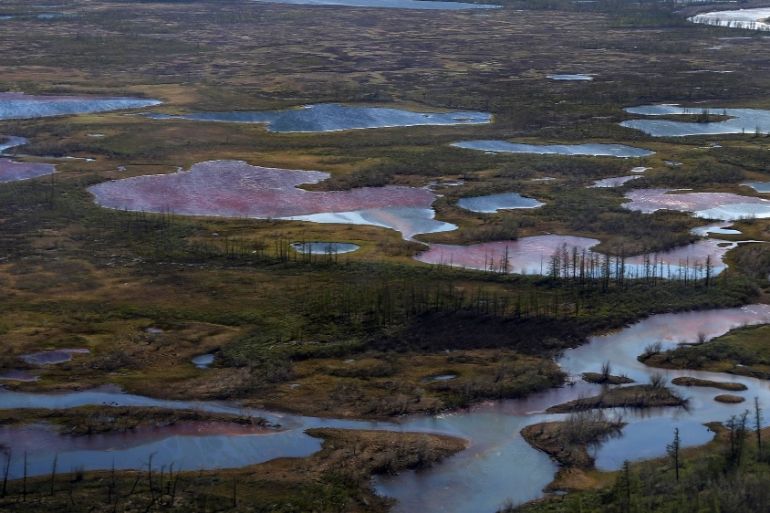Russia arrests three people over 21,000-tonne diesel spill
Arrests of three power plant staff follows fuel reservoir collapse in Siberia’s Norilsk that polluted soil and waterways

Russia has arrested three power plant staff after more than 21,000 tonnes of diesel leaked into the soil and waterways in Siberia.
The arrests came on Wednesday, weeks after the spill took place on May 29 after a fuel reservoir collapsed at a power plant operated by a subsidiary of metals giant Norilsk Nickel in the city of Norilsk beyond the Arctic Circle.
Keep reading
list of 3 itemsWorld Environment Day sees calls for protection post-COVID-19
Putin sets July 1 for constitutional reform vote
The Investigative Committee, which is probing the accident, said it had arrested the director of the power station, Pavel Smirnov, along with two engineers on suspicion of breaching environmental protection rules. If charged, they would risk up to five years in prison.
The Committee said the fuel tank had required major repairs from 2018, but the suspects “continued to use it in breach of safety rules”.
“As a result the accident occurred,” the investigators’ statement said.
In materials distributed on Tuesday, Norilsk Nickel said the fuel reservoir was built in 1985 and underwent repairs in 2017 and 2018 after which it went through a safety audit.
|
|
“The company considers this measure to be unjustifiably harsh,” the press service said in a statement to RIA Novosti news agency, citing Vice President Nikolai Utkin.
He said those arrested “are cooperating with law enforcement authorities and now they would be much more useful at the scene of the clean-up operation”.
Emergency situation
President Vladimir Putin declared an emergency situation and Norilsk Nickel head Vladimir Potanin told the president the company would pay for clean-up efforts estimated at $146m.
Regional officials have said despite efforts to contain the fuel leak using booms on the surface of a river, it has now reached a freshwater lake that is a important source of water for the region.
The pollution could now flow into the Kara Sea in the Arctic Ocean north of Siberia, which Greenpeace Russia expert Vladimir Chuprov told AFP news agency would be a “disaster”.
Norilsk Nickel’s first vice president denied the spill had reached the lake on a conference call on Wednesday, saying the company did not find contamination there.
The metals giant has said the accident could have been caused by global warming thawing the permafrost under the fuel reservoir.
The company has acknowledged it did not specifically monitor the condition of permafrost at its sites.